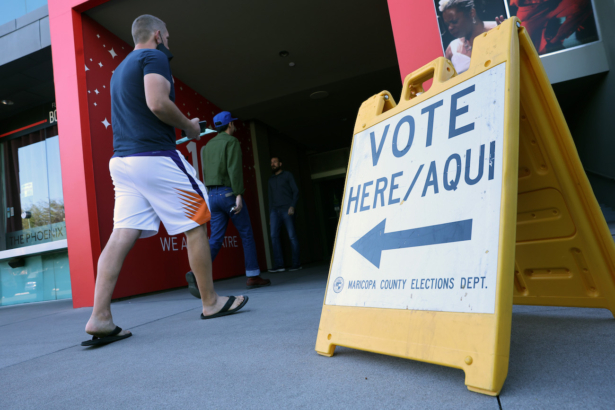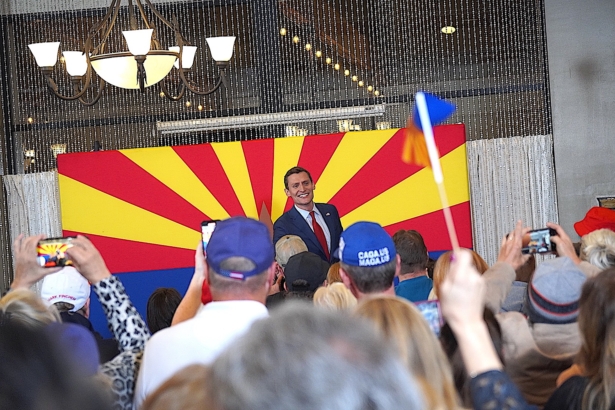As Americans awoke on Thursday, the fate of which party controls the Senate in 2023 remained uncertain.
Vote counting continued in the battleground states of Arizona and Nevada.
If the two parties split those states, Senate majority will be determined by a Dec. 6 runoff in Georgia between Democratic Sen. Raphael Warnock and Republican nominee Herschel Walker.
Should Democrats win both states, they will stay in control of the chamber with Vice President Kamala Harris having the tie-breaking vote.

In Arizona, as of 12:49 p.m. on Nov. 10, Democratic Sen. Mark Kelly had 979,509 votes (51.4 percent) compared with 884,191 (46.4 percent) for Republican nominee Blake Masters, according to New York Times figures.
In Maricopa County, Kelly held an 8-point advantage with 73 percent of the ballots counted, and a 24-point cushion in Tucson-anchored Pima County with just 63 percent of the votes tabulated.
Masters had a 13-point edge in southern Arizona’s Cochise County with 77 percent of the ballots recorded, and a 33-point lead in La Paz County, located in the western part of the state, with 70 percent of the votes tallied.
Records show that most of the other counties had counted at least 95 percent of the ballots.
As of Nov. 10 at 1:19 p.m. ET, Republican nominee Adam Laxalt had 436,854 (49.4 percent) of the votes while Democratic Sen. Catherine Cortez Masto registered 421,042 votes (47.6 percent) with 83 percent of the ballots counted, according to The New York Times.
In Clark County, Cortez Masto held a 5-point advantage with 88 percent of the votes compiled. She was clinging to a 0.24 percent lead in Washoe County with 77 percent of the ballots tabulated.
Laxalt owned a 65-point edge in Lincoln County with 79 percent of the votes counted. In Carson City, he led by 12 points with 75 percent of the ballots tallied.
In the remaining counties, 95 percent or more of the votes had been compiled.
On Nov. 9, there were around 400,000 ballots yet to be counted in Maricopa County, Arizona’s most populated county. Election officials there said they expect 95 percent of the ballots to be tabulated by Friday evening.
On Election Day, Maricopa County election officials said that tabulators in about 20 percent of polling sites were malfunctioning. Later in the day, the Maricopa County Elections Command Center released a statement reporting that “printer settings” were the cause.
In a joint statement on Nov. 9, Maricopa County Board of Supervisors Chairman Bill Gates and Vice Chairman Clint Hickman said the ballot-on-demand printers were used previously and had correctly operated during the 2022 primaries in August.
The issue impacted “less than 7 percent of Election Day voters”—or “about 17,000 ballots”—that were dropped into secure slots at the tabulators, according to the statement.
Despite the issue, voters were still able to vote at locations with defective machines, although the ballots were placed in a separate box.
The campaigns for Masters, Republican gubernatorial candidate Kari Lake, and the Republican National Committee (RNC), sued Maricopa County over the widespread problems with tabulation equipment.
An emergency motion to extend voting hours filed by the RNC, the National Republican Senatorial Committee, former state lawmaker Jill Norgaard along with Masters and Lake, was rejected on Election Day by an Arizona judge who said that “the court does not have evidence there was a voter who was precluded the right to vote.”

Fox 10 in Phoenix reported that 1.3 million ballots were cast in Maricopa County and 290,000 early ballots were deposited on Election Day. The counting of these ballots—called ” late earlies” in some places—has been known to delay the completion of counting all votes.
“When people are told to drop off their early ballot on Election Day, those can’t be counted that night. You can’t just run them through a machine,” former Maricopa County Recorder Helen Purrell told Fox 10. “They have to be signature checked, scanned first, then processed by a bipartisan board before they can be counted.”
As of Nov. 10, 1.9 million ballots were recorded in Arizona with more than 619,000 ballots remaining.
In Pima County, Arizona’s second most populated county, election officials reported that around 159,000 votes were awaiting tabulation and that process is not expected to be completed until Nov. 14 or Nov. 15, according to CNN.
In Clark County, Nevada, election officials told reporters that they will count and update ballot results over the next week.
Nevada will accept mail-in ballots through Nov. 12, as long as they were postmarked by Nov. 8.
The state also has a ballot curing process, which permits voters who submitted ballots with a mistake or missing information to correct those issues by Nov. 14.
The final results of Senate races in Arizona, Nevada, and Georgia could impact the GOP’s consensus about former president Donald Trump. Some conservatives blamed Trump for backing candidates who either lost or are currently losing.
Trump’s overall endorsement record is still successful. As of Nov. 9, 216 Republican candidates backed by the former president won their midterm elections while 19 lost to Democrats.
Trump endorsed Laxalt, Masters, and Walker.
Multiple pundits believe that Laxalt, who is Nevada’s former attorney general and served as co-chairman of Trump’s 2020 presidential campaign in the state, has a better chance of winning the midterm election than Masters.
If, when Arizona and Nevada are decided and control of the Senate will be determined by the Dec. 6 runoff between Warnock and Walker in Georgia, Democrats, Republicans, and special interest groups aligned with the parties are expected to pour millions of dollars into advertising and outreach over the next month.
From The Epoch Times
